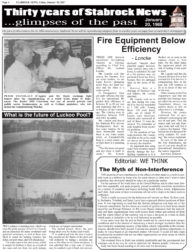Fire Equipment Below Efficiency
– Loncke
THERE ARE fourteen operational fire-fighting vehicles in Guyana, according to Chief Fire Officer Mr. Lealand Loncke.
Mr. Loncke said that among the fourteen, four are water tenders, six are Land Rovers (pumping units) three are foam tenders and the other is a water carrier.
In Georgetown, there are eight vehicles, but only five are operational. He graded their efficiency at between 85 to 40 per cent and explained that this is so because of their varying age. The vehicles were in operation between 1976 and 1985, he added.
 Mr. Loncke said that at the Stabroek Fire Service Headquarters, there are two water tenders. At the West Ruimveldt station there is one water tender while at Campbellville there is a water carrier and at Ogle there is a pumping unit.
Mr. Loncke said that at the Stabroek Fire Service Headquarters, there are two water tenders. At the West Ruimveldt station there is one water tender while at Campbellville there is a water carrier and at Ogle there is a pumping unit.
“The fire hoses are good and also there is much in stock,” Mr. Loncke declared. Despite their plentiful supply however, some vehicles carry only 4 hoses, he admitted. He said at a fire persons may see perforated hoses but this is because they are damaged right on the scene of the fire.
However, there is a shortage of firemen’s kits and ladders, Mr. Loncke admitted.
Mr. Loncke went on to say that during last year, the Fire Service responded to 1 280 calls. Among those, 138 were house calls; out of which 57 houses were destroyed. Vehicle calls numbered 41 and of these 13 were destroyed. The remainder of calls resulted from electrical problems.
On the question of low water pressure, Mr. Loncke said that as far as he could see moves are being made to remedy the situation.
He explained that using water from trenches cannot directly damage the fire-fighting equipment as it is flushed out as soon as the engines return to their base. On the other hand, the equipment stands the risk of rusting if salt water is used.
Mr. Loncke said that the Guyana Defence Force had assisted the Fire Service in extinguishing fires in the past and will continue to do so in future if they are in the area.
Other sources at the Fire Department said that the periodic fuel shortage does not affect the service as the Department always has reserve stocks to rely on when there is a shortage.
However, the source expressed fear of government’s encouraging the use of coal pots. This, the source said, not only damages roofs and wall, but is a serious fire hazard. “Our houses are not designed for using coalpots for cooking,” the source explained.
In view of the state of the Fire Department, the use of coal pots should be discontinued immediately, the source suggested.
Lawrence Jaskaran
The Myth of Non-Interference
Editorial: WE THINK
THE doctrine of non-interference in the affairs of other states is a myth invariably used as a defence by those who for some reason or other don’t want to take a position that obviously should be taken on a particular matter.
For the nations of the world have at the United Nations and in other more limited fora repeatedly, and quite properly, passed essentially moralistic resolutions on a variety of countries and topics including South Africa, Israel, Afghanistan and Chile. And some of these resolutions call for active steps to be taken such as embargos.
There is really no excuse for the behaviour of Caricom on Haiti. To their credit, Barbados, Trinidad, and Saint Lucia have expressed distinct positions of their own. It was depressing to read that the Haitian delegation was kept out of the Caricom consultation for five hours as a result of queries as to their locus standi raised by our Foreign Minister. As Mr. Louis Dejoie indicated, both the individuals and their organisations were well known both within and outside of Haiti and the whole object of the exercise was to take a decision on events in Haiti which made it desirable to be as well informed as possible.
It was quite clear that the poll in Haiti would not be carried out under proper conditions and in the interest of democracy a much stronger resolution than the one eventually requesting secrecy of the ballot, clearly impossible in the circumstances, should have been passed. Caricom has missed a glorious opportunity to make its voice heard on an important matter. Obviously it could not take steps to enforce the resolution but nor can other organisations on other issues on which they pass resolutions.
The eventual farce in Haiti was entirely predictable and the government that emerges can in no way be said to represent the Haitian people. Caricom as a body has been found wanting in its own zeal for democracy.


